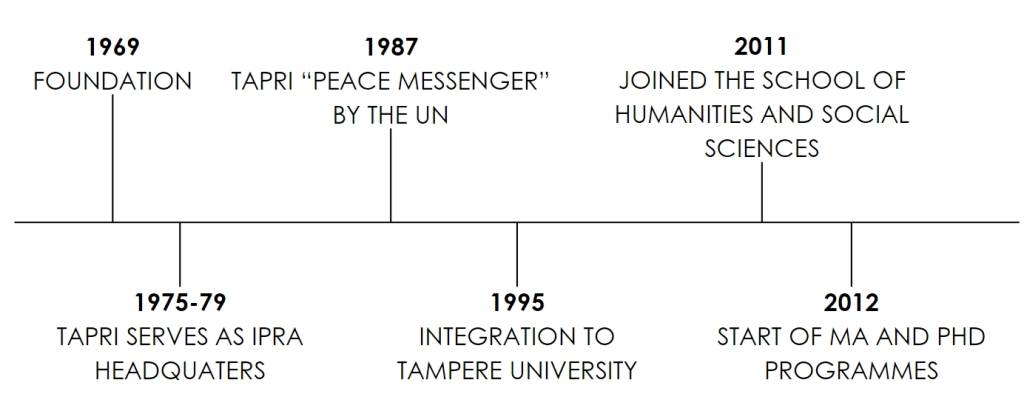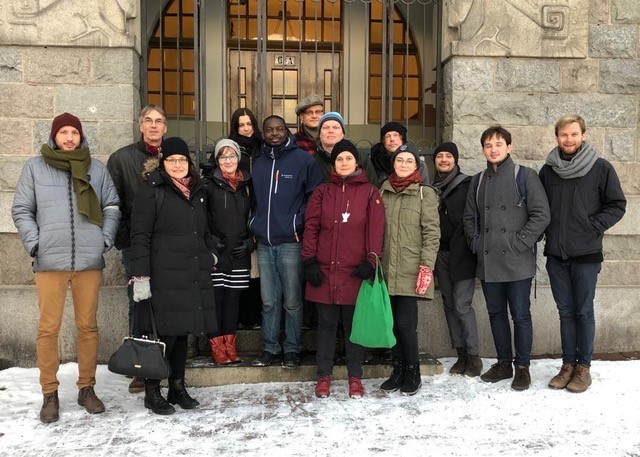TAPRI is a multidisciplinary and international research centre whose mission is to conduct high quality research on the causes of war, on non-violent transformation of conflicts, and on conditions for peace. In accordance with the present research agenda, the focus of TAPRI’s research is peaceful change. TAPRI is well known for qualitative and critical theory-oriented research with interest in praxis. Research themes include, among others, peacebuilding, post-conflict societal arrangements, peaceful third-party interventions, and the prerequisites of durable peace including the mundane and everyday dimensions of war and peace. Research themes covered at TAPRI are diverse and open to new interventions, but four thematic priority areas can be recognized: Feminist Peace Research, Peace Mediation and Peacebuilding, Everyday Peace and Global Mobility.
TAPRI is committed to high research-based public visibility and impact while also prioritizing the role of an ethical peacemaker engaging with policymakers, officials, NGOs, and civil society. The institute’s expertise has been used by a variety of different authorities, especially various ministries such as the Finnish Ministry of Foreign Affairs, of Education and of Defense, but also international organizations like the OSCE and the UN.
TAPRI also conducts doctorate training in Peace and Conflict Research and hosts a master’s programme in Peace, Mediation and Conflict Research (PEACE).
Brief History of TAPRI
Since its foundation in 1969, TAPRI has been a hub of peace research in Finland. It is the sole research centre on peace studies and the only institution in Finland which offers both master and doctoral degree programmes in peace and conflict research.
TAPRI was founded by the Finnish Parliament. In the founding document, the mission of TAPRI was set to target on research and publishing activities, international cooperation and supporting Finnish universities in peace and conflict research. Furthermore, TAPRI’s field of research was defined to address questions concerning preserving peace and resolving and managing international and national conflicts. Although TAPRI has changed during its more than half a century of existence, and its interests of research have diversified, the original mission is still applicable to today’s TAPRI.

TAPRI became part of the University of Tampere (since 2019 Tampere University) as its own, independent research unit in 1994. In 2011, TAPRI joined the School of Social Sciences and Humanities and later the Faculty of Social Sciences, retaining its independent status as a research centre. Following integration into the Faculty, TAPRI received the right to grant Doctoral Degrees, with the first degree being awarded in 2014, and in the same year it launched its own multidisciplinary master’s degree programme in Peace, Mediation and Conflict Research (PEACE) with students attending globally. The first intake to the PEACE and doctoral programmes was in 2012.
The foundation of TAPRI is connected to the establishment of peace research centres elsewhere in the Nordic region. Since its foundation, TAPRI has focused on cooperation within the Nordic countries but levels of intensity and institutionalization of cooperation among several Nordic-based peace research institutes and departments have varied. From the very beginning and until today, the strong tradition of Nordic collaboration continues, and TAPRI has taken an active role in networking.
TAPRI’s international cooperation goes beyond the Nordic and European spheres. In its early decades, TAPRI participated actively in research projects of the United Nations and its specialized agencies. Moreover, in 1987 TAPRI received the recognition as a “peace messenger” by the UN. The research centre is a long-term member of different networks focusing on cooperation around the Mediterranean and, in recent years, also in in Eastern Europe.
TAPRI has been an active member of the international peace research community. TAPRI has been active in international umbrella organizations such as the International Peace Research Association (IPRA) and the European Peace Research Association (EuPRA). In fact, in the years 1975-79, TAPRI functioned as the headquarters for IPRA. Currently, TAPRI staff members hold several positions of trust in international peace research organizations.
TAPRI Today
Today, TAPRI is internationally recognized as a reputable institute. International cooperation has been an essential part of TAPRI’s activities since its inception. Especially over the past 15 years, it has increasingly focused on international cooperation, expanding its activities and presence beyond Finland. TAPRI is recruiting researchers, doctoral students and master’s students internationally, and currently TAPRI is an international community with staff members and students from different corners of the world. The working language of TAPRI is English. TAPRI is one of the most international units at the entire Tampere University.

The current TAPRI is a dynamic, diverse and vivid community of over 20 researchers including seniors (professors and senior researchers), postdocs, doctoral students and research groups. TAPRI launched an associate researcher position in 2022 for those researchers at other units of Tampere University and elsewhere whose research work is closely linked to TAPRI. TAPRI hosts several national and internationally funded projects, and it also coordinates PROFI7 area Sustainable Security Practices (SUPRA).
The annual Tampere Peace Day is TAPRI’s flagship event, organized jointly with CMI – Martti Ahtisaari Peace Foundation, Finn Church Aid (FCA) and Felm. The event brings together the Finnish based peace ecosystem consisting of peace researchers and peace practitioners working on peacebuilding, international conflicts and security to discuss how to adapt to current challenges and work for a peaceful tomorrow.
